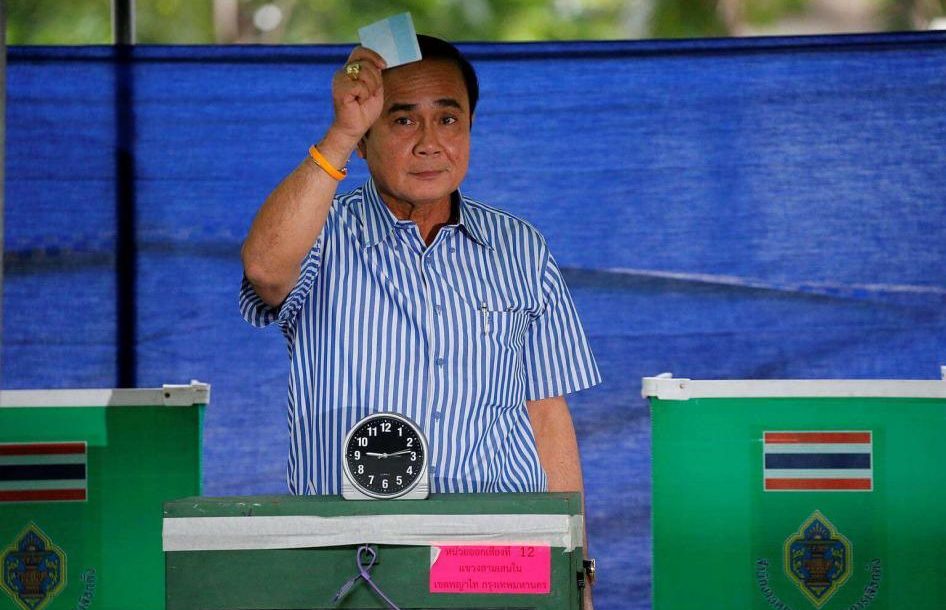The ambiguous meanings behind Thailand’s referendum result.
Thailand’s military government won a resounding and decisive victory in the country’s controversial referendum on 7 August.
While it is clear that the triumph of the Yes vote will now see the country governed by a military-backed constitution – one that sees the military and elite minority control the country’s politics well into the future – an equally important question needs to be asked: what were the intentions and motivations behind ordinary Thais’ votes? The answer is rather ambiguous.
Media, academics, and civil society have interpreted the result’s meaning from very different perspectives.
Some see the Yes vote as indicating the high popularity of the junta, while many interpret the result as an expression of Thai voters’ preference to have an election sooner rather than their willingness to support the military. Others attribute the victory to Thais’ demands for anti-corruption, or even to the Thai people’s weariness of endless political conflict.
Such ambiguity is not unusual, as referendums often pose a particularly complex challenge – what David Estlund has called the “disjunction problem.”
Simply put, the motivations behind someone’s vote for a particular outcome could be derived from numerous reasons. As a result, it is extremely difficult to identify which individual reason is the main contributor to the way someone voted, and the overall victory of one position.
It is of course impossible to grasp the complete meaning of the people’s vote since they are an aggregation of individual voices. Yet, free campaigns, public debates, and the role of the media could help mitigate the problem by roughly defining the meanings of each voting choice.
In such an open and free context, the media would start this process by articulating the main rationales in favour of each choice. Public debates and campaigns would then capture these reasons and further inform the key directions of debate.
With some degree of public consensus on the meanings behind each choice, citizens could then strategically decide to select the choice that they think is likely to win and help achieve their objectives, while neglecting their less pressing agendas. Such strategic thinking also more clearly shapes the meaning behind each choice.
The need to establish a common understanding of the meanings and the potential outcome of each vote does not imply that citizens who disregard mainstream reasons and strategic thinking are irrational.
However, providing the directions for strategic thinking and conveying the meanings assigned to each vote are nonetheless vital because they can help political actors better understand what voters want, thus enabling them to respond to voters more rationally.
In the Thai referendum, the meaning of each voting choice was poorly formed. This is largely because the authorities imposed severe restrictions ahead of the poll.
While politicians, political leaders, and key activists could express their stances on the referendum, without public debate and campaigning, the rationales in favour of each choice were scattered and conflicted with one another.
From the rhetoric expressed before the referendum, rationales for voting Yes ranged from supporting the junta and opposing Thaksin, to opposing the junta. The latter was aimed at preventing a longer term for the military government. Other reasons for advocating Yes were that the Draft Constitution was most suited for the current political circumstance, and that it could bring about a general election early.
Likewise, the rhetoric for voting No expressed prior to the poll widely ranged from supporting the junta to opposing the junta.
The former indicates a preference for the junta to stay in power longer. The latter showed disagreements with the content in the Draft Constitution, which will result in an enhancement of the elites control over Thai politics and considerable reductions of entitlements on citizen’s fundamental rights. Some Thais also expressed their intentions by not to voting to refuse the legitimacy of the junta-backed Draft Constitution and the unfair referendum.
As a result, post-referendum Thai society remains unsure of the vote’s overall meaning. Political actors, in turn, cannot rationally respond in such a situation. This has led to more questions about the future directions of Thailand’s politics. For example, should the military remain in government longer? Which parts of the Constitution should be especially reconsidered? Or what are the main areas we should improve in the future?
What Thai society could do now is to attempt to understand the meanings of the vote better – perhaps by conducting valid opinion polls. Otherwise, with the ambiguous meanings of the people’s votes, each group could endlessly interpret the meanings in favour of their preferences — and this would bring about the problem of the legitimacy, which is ironically the raison d’être of the referendum.
Tawan Manakun is a master’s degree candidate in political theory at London School of Economics and Political Science.
Jittip Mongkolnchaiarunya is a master’s degree candidate in international affairs at Columbia University’s School of International and Public Affairs. She is currently interning at the Sydney Cyber Security Network, the University of Sydney.
 Facebook
Facebook  Twitter
Twitter  Soundcloud
Soundcloud  Youtube
Youtube  Rss
Rss 